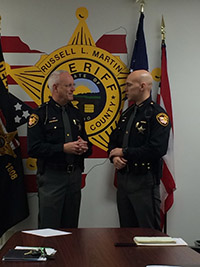
Seven simple rules to help in the workplace and community.
How critical is the skill of communication for law enforcement officers? It’s imperative, important and instrumental! It’s foundational to a successful law enforcement career on several levels.
My father, who was a front line factory worker for 42 years, taught me the valuable lesson of being able to speak and listen to anyone. Although he did not possess much formal education he garnered significant respect throughout the community because of his ability to communicate.
I recently wrote about the value of a hiring process that includes base line testing, a thorough background investigation, psychological reviews and a vetting process that includes asking the right questions. Here it begins; asking the right questions means exercising sound communication skills that help evaluate the candidate. And just as importantly is the ability to actively and intentionally listen to the other person.
Exercising sound communication practices can have a positive impact in who is chosen to represent our law enforcement presence in our communities, how we direct, train and encourage personnel and just importantly how we interact with the citizens we serve.
Let’s review a few critical, but sometimes overlooked communication rules that can enhance any agency as they strive to gain the trust of both the communities they serve and the people they direct.
1-If you’re preparing an answer before the other person is done talking you’re not really listening. When you prematurely engage your mind with the preconceived solution you will probably miss a critical cue.
2-Empathy is an often overlooked platform to begin any conversation either in the workplace or in the community. As the conversation unfolds it’s valuable to consider where the other person is coming from or what they live with.
3-Presumption is the lowest level of intelligence in which to operate. If you presume to know the other person’s motive and you struggle with their intent find a tactful way to ask them if there message has an additional motive.
4-You have to eliminate distractions. If you’re glancing at your phone or computer you have already sent a pretty clear message; you’re not that important. If you need to finish a quick task ask for a second and then focus on the speaker.
5-Avoid “heavy” discussions or complicated issues when you are fatigued. As an emergency responder this may be difficult with the community or internal stakeholders, but it’s good to know your limitations and not “bite off more than you can chew.” Go back to the real problem when rested or refreshed for a more long term solution.
6-Anger is a normal common emotion. It is written that we should “be quick to listen, slow to speak and slow to become angry.” What is critical is that you don’t let the anger overwhelm good communication practices. In the workplace you may have to admit your anger and tell the co-worker you will return to the discussion after you’ve taken time to digest the issue. When dealing with the community you can never allow anger or frustration to overcome what is the right response. A wise man wrote “that a gentle answer turns away wrath.” When taunted don’t respond in the same manner.
7-Humility goes a long way and fosters trust. You don’t have to know everything and frankly if you come off as if you did people will find you disingenuous. If you don’t know the answer or have a solution admit it, but let people know you intend to figure it out or get the right resources.
Communication in any arena is a critical and daunting task that is actually a discipline developed over time with a focus on improvement. It is intentional and takes effort to improve both your active listening skills and appropriate responses. Time dedicated to this skill reaps long term benefits. Practice breeds success.
This post was originally published on January 7, 2017 on Sheriff Martin’s blog.